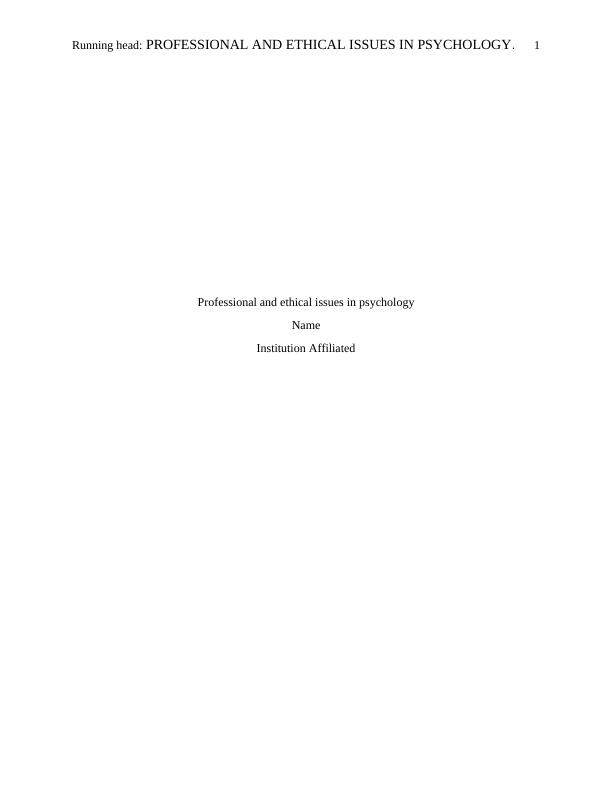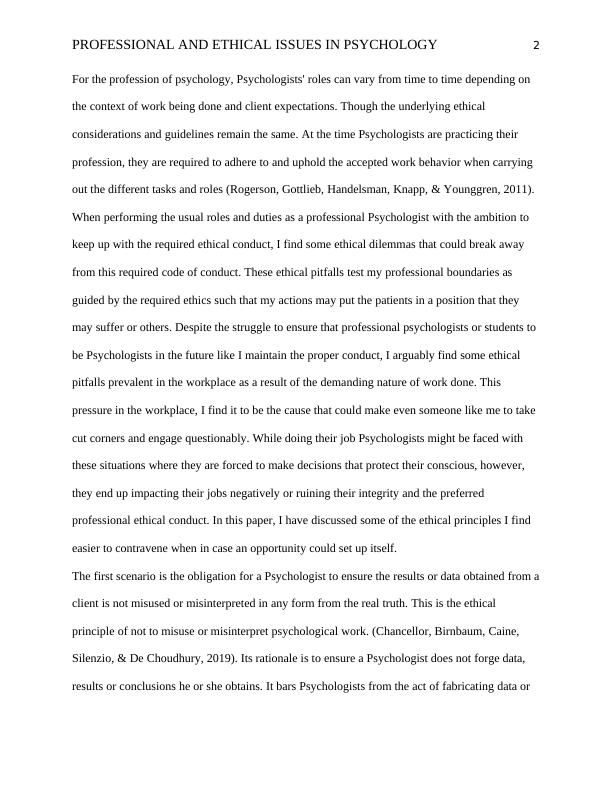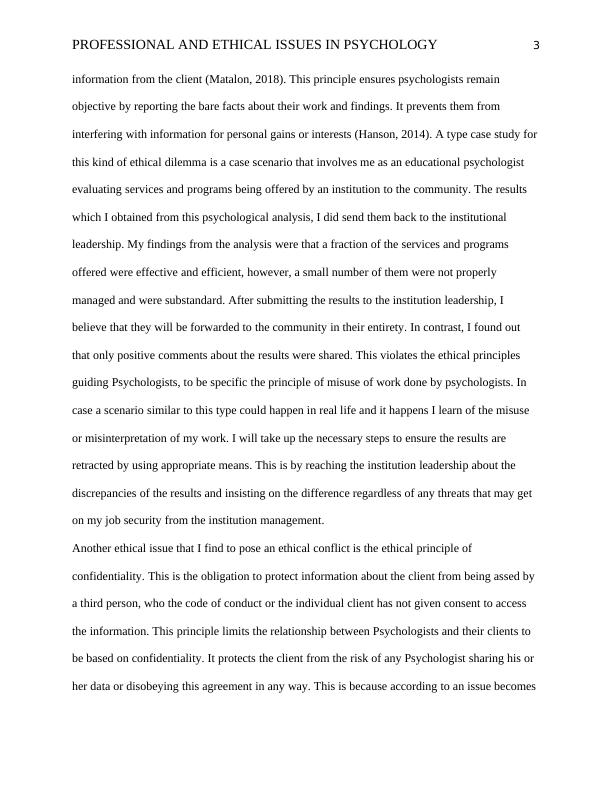PROFESSIONAL AND ETHICAL ISSUES IN PSYCHOLOGY
Added on 2022-09-09
8 Pages2362 Words54 Views
Running head: PROFESSIONAL AND ETHICAL ISSUES IN PSYCHOLOGY. 1
Professional and ethical issues in psychology
Name
Institution Affiliated
Professional and ethical issues in psychology
Name
Institution Affiliated

PROFESSIONAL AND ETHICAL ISSUES IN PSYCHOLOGY 2
For the profession of psychology, Psychologists' roles can vary from time to time depending on
the context of work being done and client expectations. Though the underlying ethical
considerations and guidelines remain the same. At the time Psychologists are practicing their
profession, they are required to adhere to and uphold the accepted work behavior when carrying
out the different tasks and roles (Rogerson, Gottlieb, Handelsman, Knapp, & Younggren, 2011).
When performing the usual roles and duties as a professional Psychologist with the ambition to
keep up with the required ethical conduct, I find some ethical dilemmas that could break away
from this required code of conduct. These ethical pitfalls test my professional boundaries as
guided by the required ethics such that my actions may put the patients in a position that they
may suffer or others. Despite the struggle to ensure that professional psychologists or students to
be Psychologists in the future like I maintain the proper conduct, I arguably find some ethical
pitfalls prevalent in the workplace as a result of the demanding nature of work done. This
pressure in the workplace, I find it to be the cause that could make even someone like me to take
cut corners and engage questionably. While doing their job Psychologists might be faced with
these situations where they are forced to make decisions that protect their conscious, however,
they end up impacting their jobs negatively or ruining their integrity and the preferred
professional ethical conduct. In this paper, I have discussed some of the ethical principles I find
easier to contravene when in case an opportunity could set up itself.
The first scenario is the obligation for a Psychologist to ensure the results or data obtained from a
client is not misused or misinterpreted in any form from the real truth. This is the ethical
principle of not to misuse or misinterpret psychological work. (Chancellor, Birnbaum, Caine,
Silenzio, & De Choudhury, 2019). Its rationale is to ensure a Psychologist does not forge data,
results or conclusions he or she obtains. It bars Psychologists from the act of fabricating data or
For the profession of psychology, Psychologists' roles can vary from time to time depending on
the context of work being done and client expectations. Though the underlying ethical
considerations and guidelines remain the same. At the time Psychologists are practicing their
profession, they are required to adhere to and uphold the accepted work behavior when carrying
out the different tasks and roles (Rogerson, Gottlieb, Handelsman, Knapp, & Younggren, 2011).
When performing the usual roles and duties as a professional Psychologist with the ambition to
keep up with the required ethical conduct, I find some ethical dilemmas that could break away
from this required code of conduct. These ethical pitfalls test my professional boundaries as
guided by the required ethics such that my actions may put the patients in a position that they
may suffer or others. Despite the struggle to ensure that professional psychologists or students to
be Psychologists in the future like I maintain the proper conduct, I arguably find some ethical
pitfalls prevalent in the workplace as a result of the demanding nature of work done. This
pressure in the workplace, I find it to be the cause that could make even someone like me to take
cut corners and engage questionably. While doing their job Psychologists might be faced with
these situations where they are forced to make decisions that protect their conscious, however,
they end up impacting their jobs negatively or ruining their integrity and the preferred
professional ethical conduct. In this paper, I have discussed some of the ethical principles I find
easier to contravene when in case an opportunity could set up itself.
The first scenario is the obligation for a Psychologist to ensure the results or data obtained from a
client is not misused or misinterpreted in any form from the real truth. This is the ethical
principle of not to misuse or misinterpret psychological work. (Chancellor, Birnbaum, Caine,
Silenzio, & De Choudhury, 2019). Its rationale is to ensure a Psychologist does not forge data,
results or conclusions he or she obtains. It bars Psychologists from the act of fabricating data or

PROFESSIONAL AND ETHICAL ISSUES IN PSYCHOLOGY 3
information from the client (Matalon, 2018). This principle ensures psychologists remain
objective by reporting the bare facts about their work and findings. It prevents them from
interfering with information for personal gains or interests (Hanson, 2014). A type case study for
this kind of ethical dilemma is a case scenario that involves me as an educational psychologist
evaluating services and programs being offered by an institution to the community. The results
which I obtained from this psychological analysis, I did send them back to the institutional
leadership. My findings from the analysis were that a fraction of the services and programs
offered were effective and efficient, however, a small number of them were not properly
managed and were substandard. After submitting the results to the institution leadership, I
believe that they will be forwarded to the community in their entirety. In contrast, I found out
that only positive comments about the results were shared. This violates the ethical principles
guiding Psychologists, to be specific the principle of misuse of work done by psychologists. In
case a scenario similar to this type could happen in real life and it happens I learn of the misuse
or misinterpretation of my work. I will take up the necessary steps to ensure the results are
retracted by using appropriate means. This is by reaching the institution leadership about the
discrepancies of the results and insisting on the difference regardless of any threats that may get
on my job security from the institution management.
Another ethical issue that I find to pose an ethical conflict is the ethical principle of
confidentiality. This is the obligation to protect information about the client from being assed by
a third person, who the code of conduct or the individual client has not given consent to access
the information. This principle limits the relationship between Psychologists and their clients to
be based on confidentiality. It protects the client from the risk of any Psychologist sharing his or
her data or disobeying this agreement in any way. This is because according to an issue becomes
information from the client (Matalon, 2018). This principle ensures psychologists remain
objective by reporting the bare facts about their work and findings. It prevents them from
interfering with information for personal gains or interests (Hanson, 2014). A type case study for
this kind of ethical dilemma is a case scenario that involves me as an educational psychologist
evaluating services and programs being offered by an institution to the community. The results
which I obtained from this psychological analysis, I did send them back to the institutional
leadership. My findings from the analysis were that a fraction of the services and programs
offered were effective and efficient, however, a small number of them were not properly
managed and were substandard. After submitting the results to the institution leadership, I
believe that they will be forwarded to the community in their entirety. In contrast, I found out
that only positive comments about the results were shared. This violates the ethical principles
guiding Psychologists, to be specific the principle of misuse of work done by psychologists. In
case a scenario similar to this type could happen in real life and it happens I learn of the misuse
or misinterpretation of my work. I will take up the necessary steps to ensure the results are
retracted by using appropriate means. This is by reaching the institution leadership about the
discrepancies of the results and insisting on the difference regardless of any threats that may get
on my job security from the institution management.
Another ethical issue that I find to pose an ethical conflict is the ethical principle of
confidentiality. This is the obligation to protect information about the client from being assed by
a third person, who the code of conduct or the individual client has not given consent to access
the information. This principle limits the relationship between Psychologists and their clients to
be based on confidentiality. It protects the client from the risk of any Psychologist sharing his or
her data or disobeying this agreement in any way. This is because according to an issue becomes

End of preview
Want to access all the pages? Upload your documents or become a member.
Related Documents
Reflection on Learning Ethical Principles in Psychology Practice during COVID-19 Pandemiclg...
|3
|1136
|79
Principles and Code of Ethics Assignment PDFlg...
|8
|2095
|206
Business Ethics and Sustainability in Hotel Industrylg...
|4
|657
|127
Ethics Autobiography Article 2022lg...
|6
|1402
|22
Ethics in the Justice Fieldlg...
|10
|2177
|66
EMERGING AREAS OF HUMAN HEALTH.lg...
|4
|430
|174
